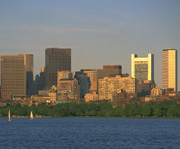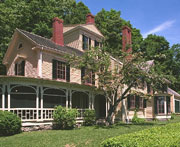美国城市-波士顿
(单词翻译:单击)
Boston (U.S.)

Calling this quaint1 and charming city the 'Athens of America' might seem a bit braggadocio2(自夸), but the city's 19th-century glory radiates through its grand architecture, its population of literati(文人), artists and educators and its world-renowned academic and cultural institutions. Disastrous3 'urban renewal'(城市重建)in the 1950s provoked such a furious backlash that Boston now has some of the best preserved historic buildings and neighbourhoods in the country. Compact, walkable, historic and clean, the city blends old-world beauty and modern convenience. Boston is on a small peninsula in the middle of Massachusetts' Atlantic Coast, a little over 320km northeast of New York City. Most of the city's sights are contained in less than 8 sq km. Cambridge (home of Harvard and MIT) is a short drive or subway ride north across the Charles River. Called Trimountain (from its three hills) in its earliest days, Boston took its permanent name from the English town. The vanguard(先驱)of English settlers, led by Reverend William Blaxton, arrived in 1624 - less than four years after the Pilgrims arrived in nearby Plymouth(普利茅斯). The colony of Massachusetts Bay was established six years later in 1630 when the elder John Winthrop, official representative of the Massachusetts Bay Company, took up residence. From the beginning this was the centre of Puritan culture and life in the New World.
Though the New England coast had many excellent natural ports. Boston was blessed by geography with the best of all. By the early 1700s it was well on its way to being what it remains7 today: New England's largest and most important city. As the chief city in the region, it drew London's attention. When King George III and Parliament chose to burden the colonies with taxation8 without representation, the taxes were first levied(征收)in Boston. When resistance surfaced, it was in Boston. The Boston Massacre9 and the Boston Tea Party were signal events in the development of revolutionary sentiments, and the Battle of Bunker Hill solidified10 colonial resolve to declare independence from the British crown. Following the Revolutionary War, Boston suffered economically as the British government cut off American ships' access to other ports in the British Empire. But as new trading relationships developed, Boston entered a commercial and industrial boom which lasted from the late 1700s until the mid-1800s. Fortunes were made in shipbuilding, maritime11 trade and manufacturing textiles and shoes. Chartered as a city in 1822, Boston's Beacon12 Hill was soon crowned with fine mansions13 built by the leading families, and Back Bay was filled in to make room for more.
As the 19th century drew to a close Boston's prominence15 was challenged by the growth of other port cities and the westward16 expansion of the national borders, and New England's economic boom turned into a bust17 when the textile and shoe factories moved to cheaper labour markets in the South. In the 20th century the city became more culturally diverse than ever before. The city's ethnic18 and economic profile had already been significantly altered by the 19th-century arrival of thousands of Irish immigrants, driven from home by devastating19 potato famines. The cultural mix grew more diverse with 20th century arrivals from Italy, the Ottoman Empire and Portugal. Economically, Boston became more of a satellite than a hub, although it remained a prominent centre for medical education, treatment and research, and USA's premiere university centre. Many graduates choose to remain in the Boston area, which has helped fuel a local booming commerce in computer research, development and manufacturing. For all its ties to the past, Boston has always looked forward. The new millennium20 saw Boston entering a renaissance21, thanks to the near-completion of the 'Big Dig' - an ambitious public works project to place the Central Expressway underground. Wealthy young professionals are moving back to the city in droves and, since the demise22 of rent control in the mid-1990s, they are the only ones who can reasonably afford to live there! Affluent23 and comfortable, Boston remains at the centre of US intellectual life. |
 收听单词发音
收听单词发音
1
quaint

|
|
| adj.古雅的,离奇有趣的,奇怪的 | |
参考例句: |
|
|
|
2
braggadocio

|
|
| n.吹牛大王 | |
参考例句: |
|
|
|
3
disastrous

|
|
| adj.灾难性的,造成灾害的;极坏的,很糟的 | |
参考例句: |
|
|
|
4
theocratic

|
|
| adj.神权的,神权政治的 | |
参考例句: |
|
|
|
5
rhetoric

|
|
| n.修辞学,浮夸之言语 | |
参考例句: |
|
|
|
6
elite

|
|
| n.精英阶层;实力集团;adj.杰出的,卓越的 | |
参考例句: |
|
|
|
7
remains

|
|
| n.剩余物,残留物;遗体,遗迹 | |
参考例句: |
|
|
|
8
taxation

|
|
| n.征税,税收,税金 | |
参考例句: |
|
|
|
9
massacre

|
|
| n.残杀,大屠杀;v.残杀,集体屠杀 | |
参考例句: |
|
|
|
10
solidified

|
|
| (使)成为固体,(使)变硬,(使)变得坚固( solidify的过去式和过去分词 ); 使团结一致; 充实,巩固; 具体化 | |
参考例句: |
|
|
|
11
maritime

|
|
| adj.海的,海事的,航海的,近海的,沿海的 | |
参考例句: |
|
|
|
12
beacon

|
|
| n.烽火,(警告用的)闪火灯,灯塔 | |
参考例句: |
|
|
|
13
mansions

|
|
| n.宅第,公馆,大厦( mansion的名词复数 ) | |
参考例句: |
|
|
|
14
abolition

|
|
| n.废除,取消 | |
参考例句: |
|
|
|
15
prominence

|
|
| n.突出;显著;杰出;重要 | |
参考例句: |
|
|
|
16
westward

|
|
| n.西方,西部;adj.西方的,向西的;adv.向西 | |
参考例句: |
|
|
|
17
bust

|
|
| vt.打破;vi.爆裂;n.半身像;胸部 | |
参考例句: |
|
|
|
18
ethnic

|
|
| adj.人种的,种族的,异教徒的 | |
参考例句: |
|
|
|
19
devastating

|
|
| adj.毁灭性的,令人震惊的,强有力的 | |
参考例句: |
|
|
|
20
millennium

|
|
| n.一千年,千禧年;太平盛世 | |
参考例句: |
|
|
|
21
renaissance

|
|
| n.复活,复兴,文艺复兴 | |
参考例句: |
|
|
|
22
demise

|
|
| n.死亡;v.让渡,遗赠,转让 | |
参考例句: |
|
|
|
23
affluent

|
|
| adj.富裕的,富有的,丰富的,富饶的 | |
参考例句: |
|
|
|

 Puritanism was intellectual and
Puritanism was intellectual and  These same prominent families also patronised arts and culture heavily. Though conservative and traditionalist in their general outlook, Bostonians were firm believers in American ideals of freedom and firm supporters of the
These same prominent families also patronised arts and culture heavily. Though conservative and traditionalist in their general outlook, Bostonians were firm believers in American ideals of freedom and firm supporters of the 


